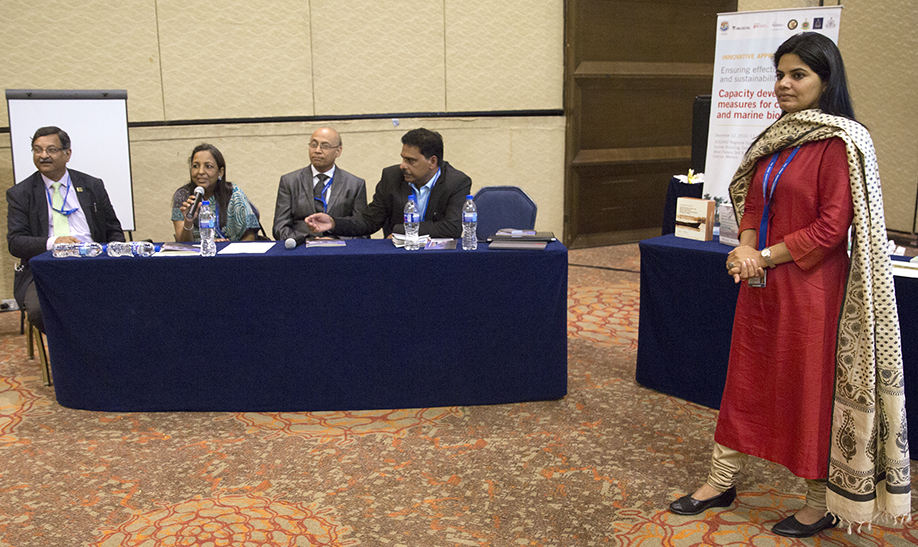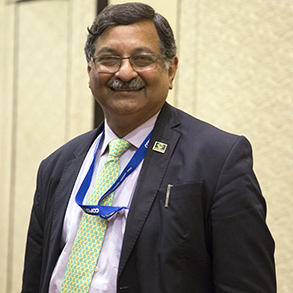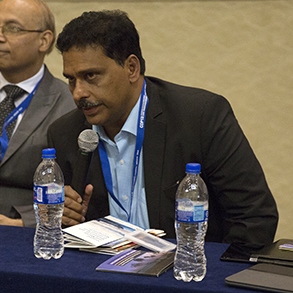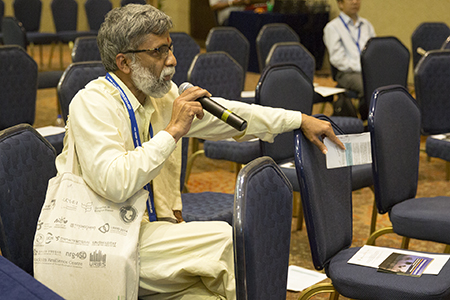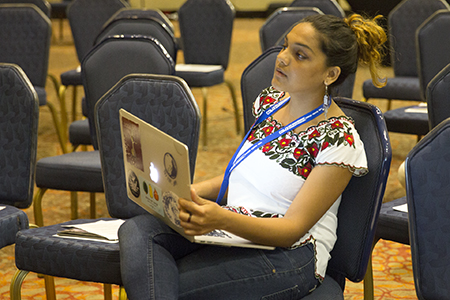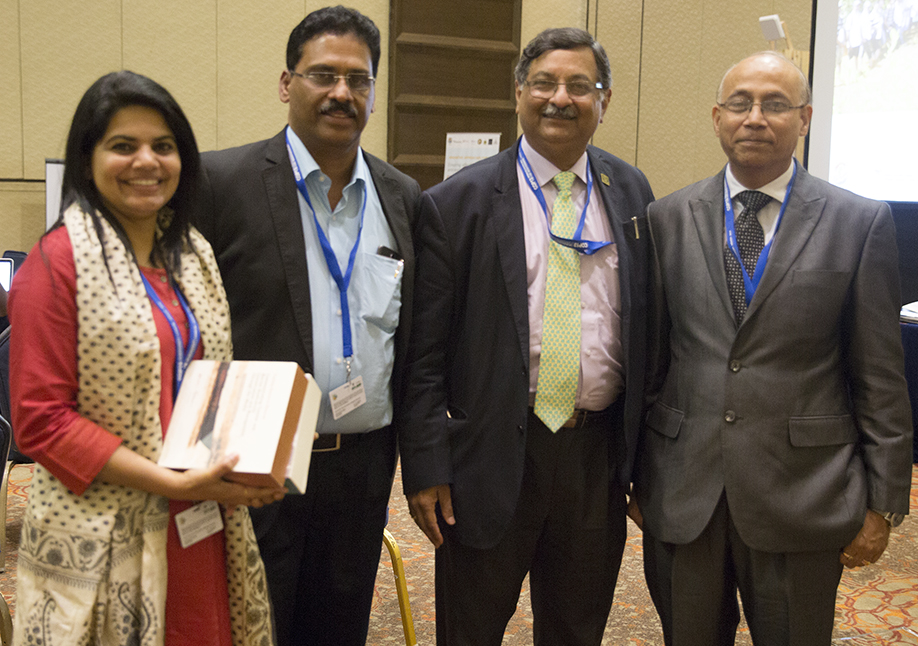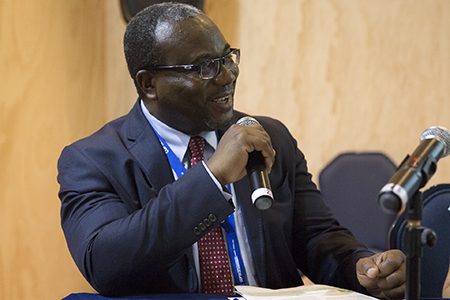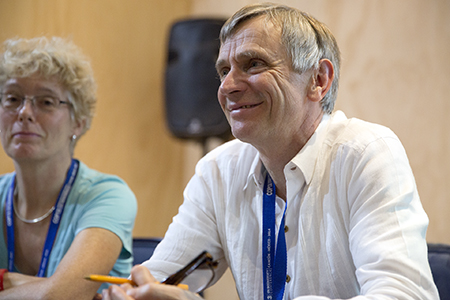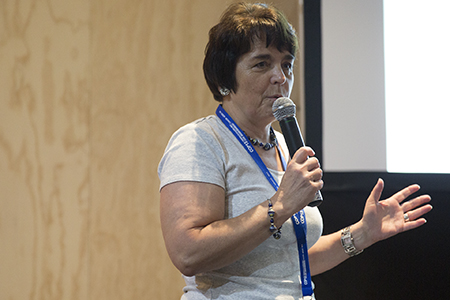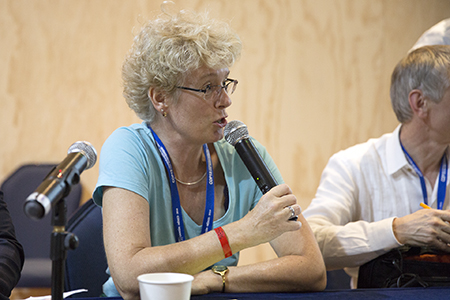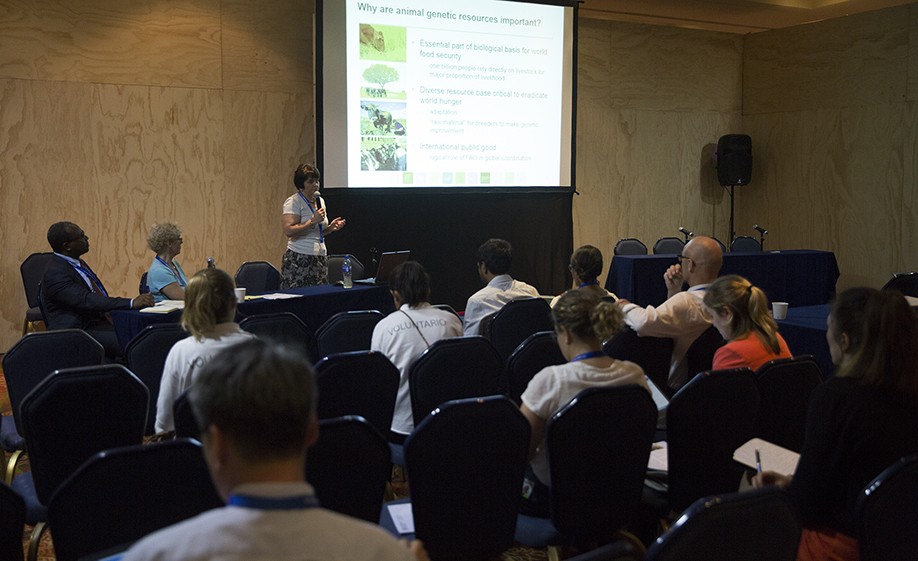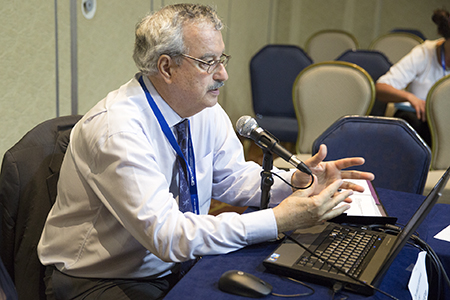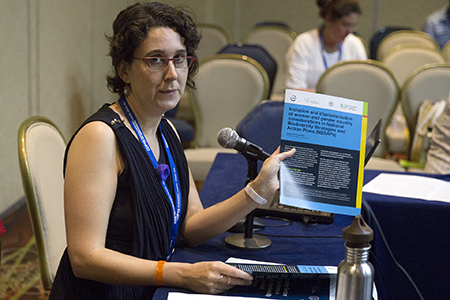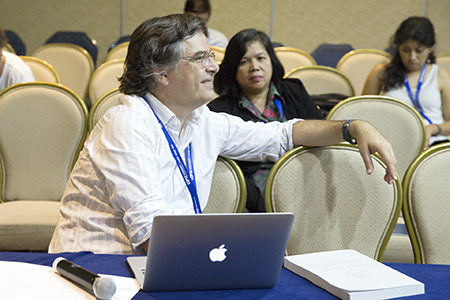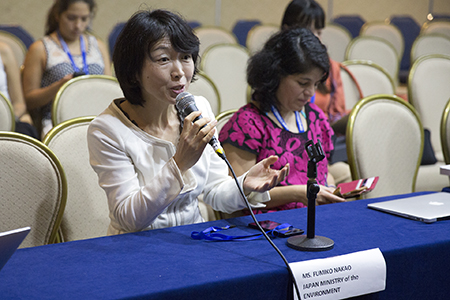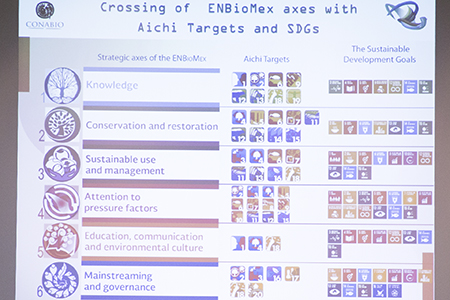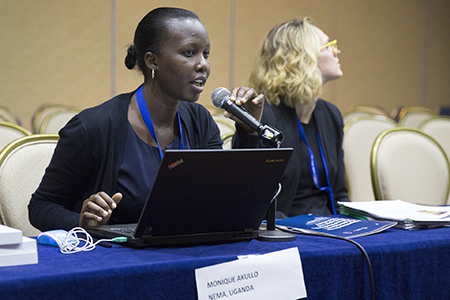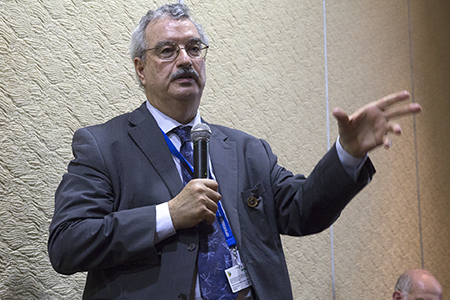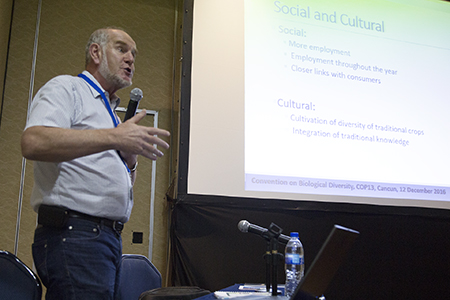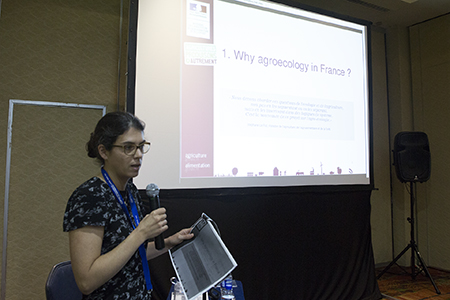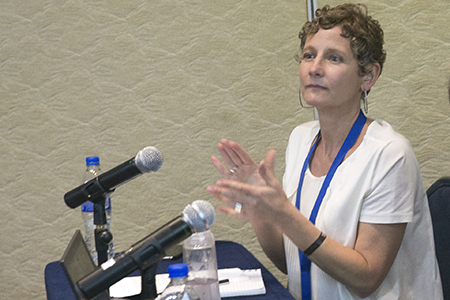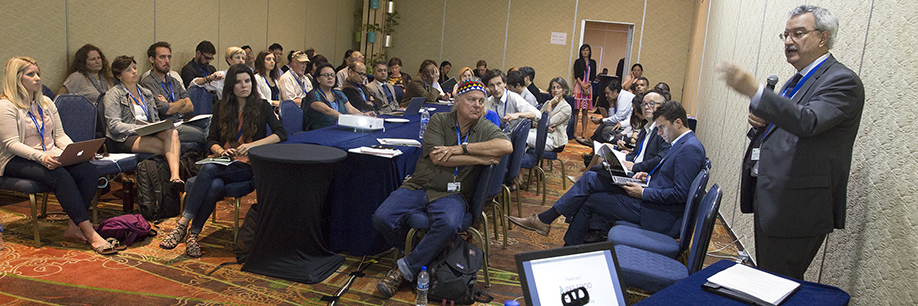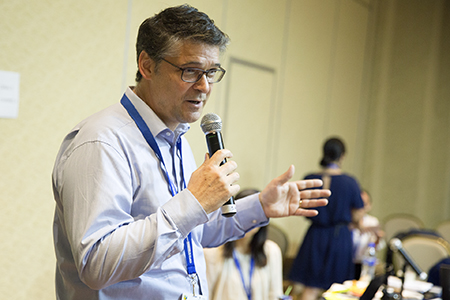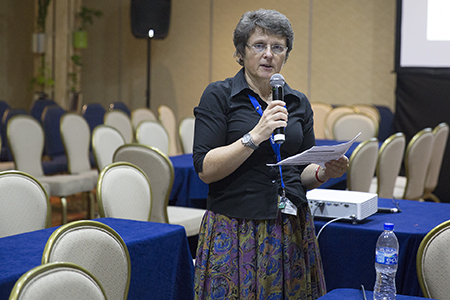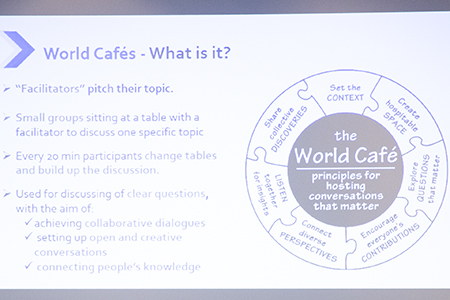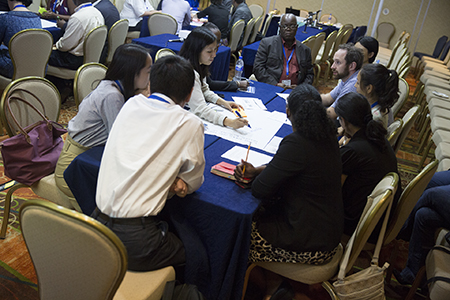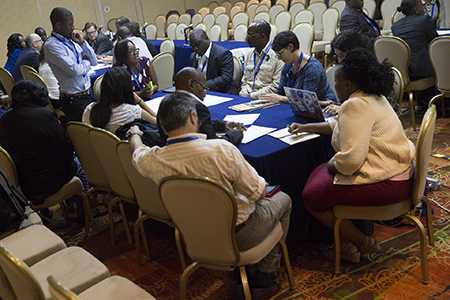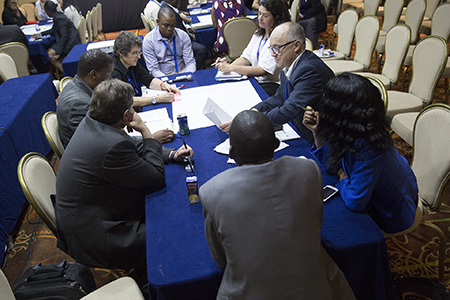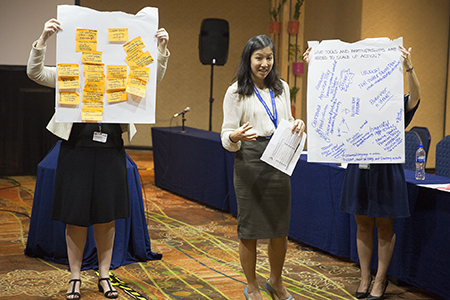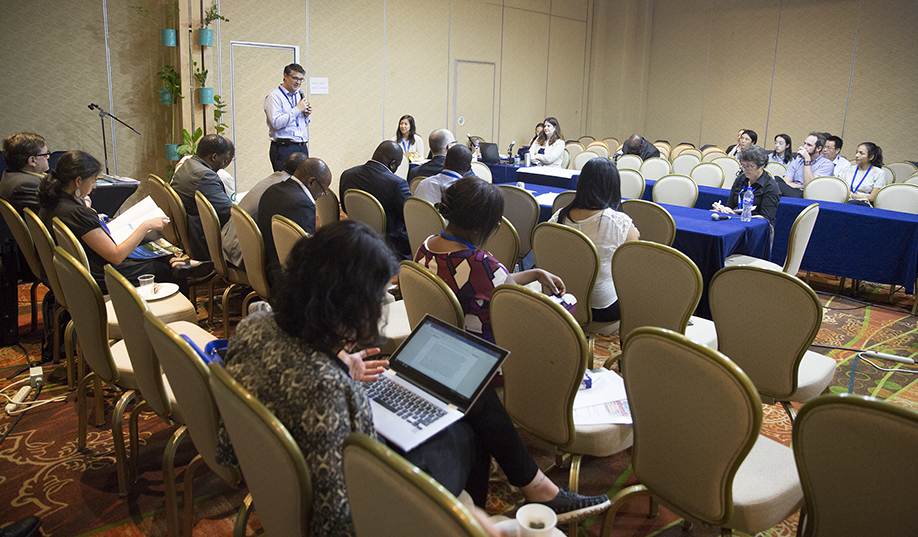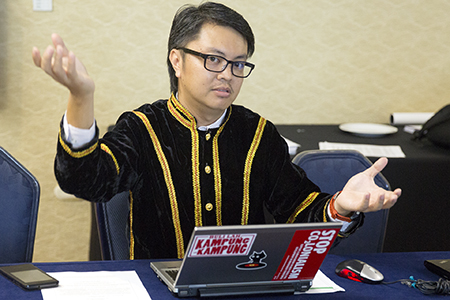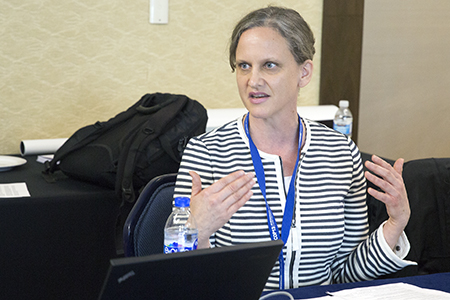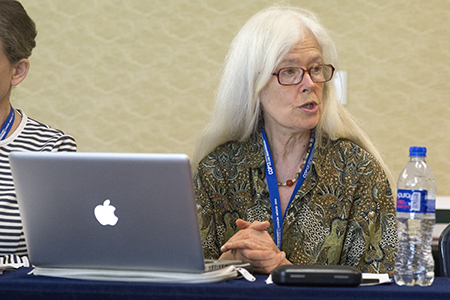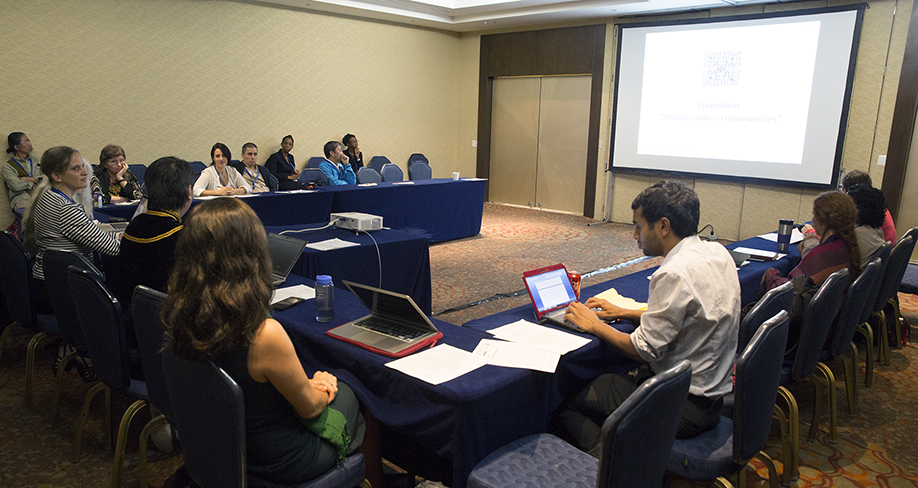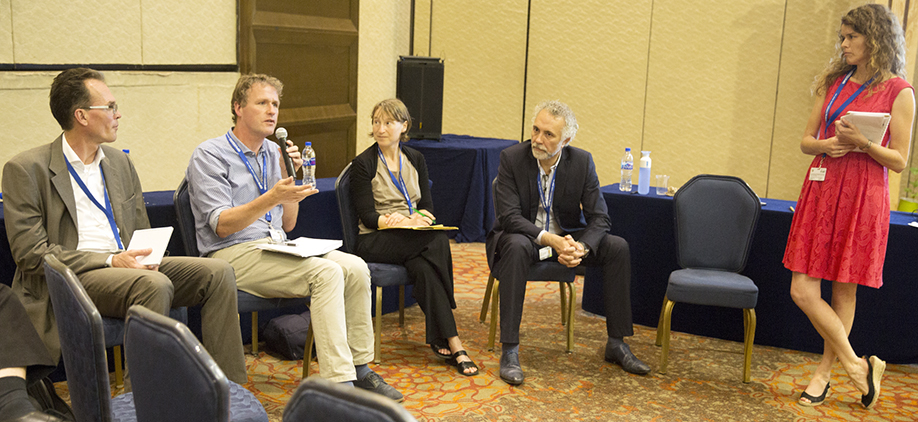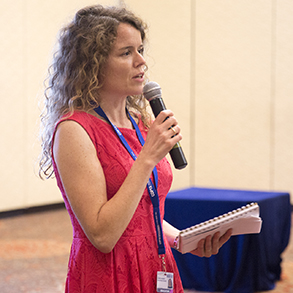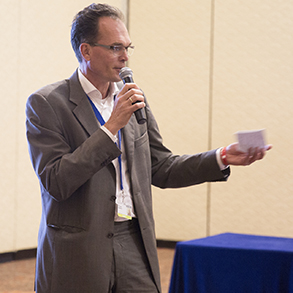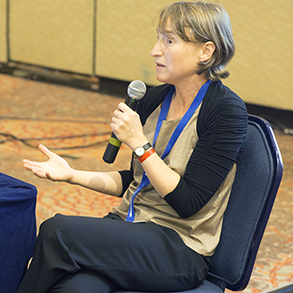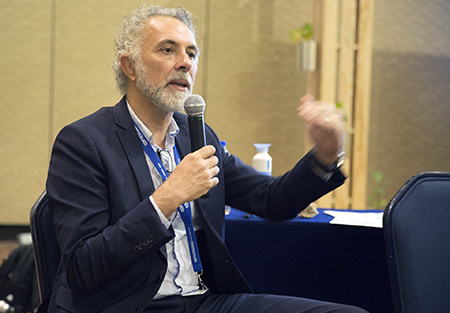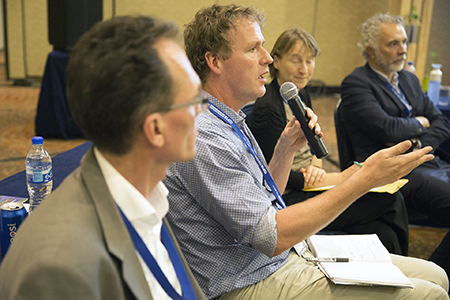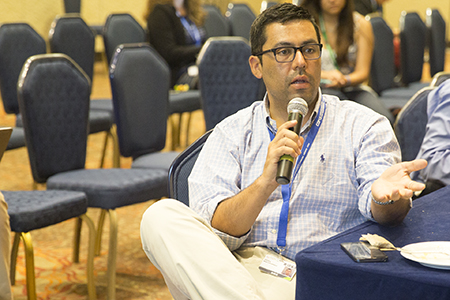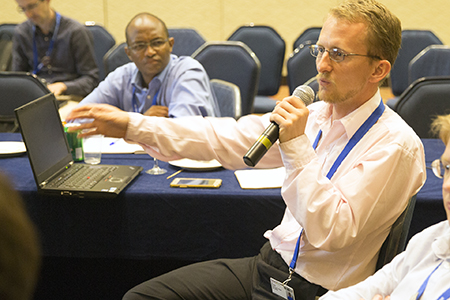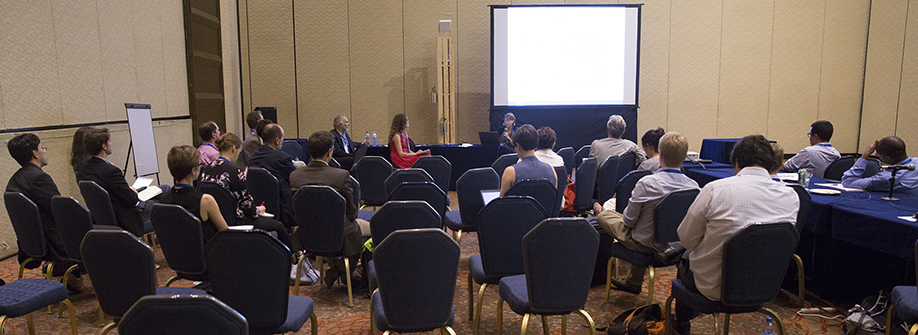Summary
The following events were ecovered by IISD Reporting Services on Monday, 12 December 2016:
- Innovative Approaches for Ensuring Effectiveness and Sustainability: Capacity Development Measures for Coastal and Marine Biodiversity Conservation
- Genetic Diversity for a World Without Hunger: International Cooperation Through the Food and Agriculture Organization of the UN (FAO)
- Integrating Gender Considerations in National Biodiversity Strategies and Action Plans (NBSAPs)
- Transforming Agriculture into a Solution
- Advances in Using Law and Policies to Mainstream Biodiversity: How to Scale Up?
- Tourism and Biodiversity: Benefits and Hazards
- Lessons from the Paris Climate Agreement for the Convention on Biological Diversity (CBD)
IISD Reporting Services, through its ENBOTS Meeting Coverage, is providing daily web coverage of selected side-events from the UN Biodiversity Conference.
Photos by IISD/ENB | Diego Noguera
For photo reprint permissions, please follow instructions at our Attribution Regulations for Meeting Photo Usage Page.
Innovative Approaches for Ensuring Effectiveness and Sustainability: Capacity Development Measures for Coastal and Marine Biodiversity Conservation
Presented by the Wildlife Institute of India (WII), and Deutsche Gesellschaft für Internationale Zusammenarbeit (GIZ) GmbH on behalf of the German Federal Ministry for the Environment, Nature Conservation, Building and Nuclear Safety (BMUB)
This event was moderated by Neeraj Khera, GIZ. Vinod B. Mathur, Director, WII, discussed India’s wilderness resources in coastal and marine environments and the need for capacity building in order to meet the challenges in this sector, stressing the involvement of the media in awareness raising. Pointing to the country’s marine protected area (MPA) network, he drew attention to the challenges faced in the conservation of marine and coastal resources, including mechanized fishing, oil spills, invasive alien species (IAS), climate change, and over population.
Amita Prasad, Ministry of Environment, Forest and Climate Change (MoEFCC), India, stressed that a “one-size-fits-all” approach does not work for the country’s marine and coastal ecosystems. She drew attention to gendered e-learning platforms that have been established to address various stakeholders dependent on these ecosystems. She highlighted the challenges due to upscaling pilot projects, and stressed the need for capacity building and awareness raising to assist local communities to translate international decisions to local-level action.
Khera spoke on the Indo-German approach to coastal and marine protected area (CMPA), highlighting that the project works by strengthening capacity to support participatory management of CMPAs. She noted the involvement of stakeholders from key sectors including forestry, fisheries and the media, pointing to the development of a curriculum for decision makers on marine ecosystem management. On the sustainability aspect of the CMPA project, she identified, inter alia, training of trainers, and building networks between training institutions to ensure post-project continuity. Khera then presented the official release of the training material on Communicating Coastal and Marine Biodiversity and Protected Area Management through the Media, as well as the training material for senior Indian Forestry Service (IFS) officers.
Stressing that there is “no copyright on good ideas and good solutions” and calling for sharing lessons and solutions, Elsa Nickel, BMUB, Germany, noted her country’s support for countries committed to the conservation of biodiversity, highlighting the Indo-German cooperation on biodiversity including on capacity building.
Alok Saxena, Government of Andaman and Nicobar Islands, India, said that the state forestry department initially managed these islands, even though they were ill equipped to do so. He noted that this led to the development of training courses on marine and coastal biodiversity for these forestry probationers. He highlighted additional training modules and capacity building sessions specifically designed and required for the IFS probationers who were assigned to coastal states, mostly due to the management challenges related to the country’s large number of MPAs.
N. Vasudevan, Maharashtra Forest Department, India, spoke on the nationally standardized yet locally customized approaches to CMPA, highlighting trainings for field-level managers in the State of Maharashtra. He highlighted two levels of training including: site visits to fish markets to understand fishers needs and scuba diving training; and in-state trainings including site visits to the mangrove areas, and visits to sites in Malaysia.
In the discussions, participants considered the potential for seaweed export, capacity building for youth in the management of coastal and marine biodiversity management, the opportunity to push back against the “advancing fossil fuel frontier” in order to ensure biodiversity conservation, and the need to find win-win technological solutions to conservation and development, including working with the oil and gas sector.
(L-R): Vinod B. Mathur, Director, WII; Amita Prasad, MoEFCC, India; Alok Saxena, Government of Andaman and Nicobar Islands, India; N. Vasudevan, Maharashtra Forest Department, India; and Neeraj Khera, GIZ
Vinod B. Mathur, Director, WII, said that the conservation of marine resources is at odds with oil exploration and other development objectives in India.
Amita Prasad, MoEFCC, India, highlighted the wide range of coastal ecosystems, noting the challenges related to the country’s overpopulation and their dependence on natural resources.
N. Vasudevan, Maharashtra Forest Department, India
Participants during the discussion.
Panelist group photo at the end of the event.
Contact:
- Neeraj Khera (Coordinator)
| neeraj.khera@giz.de
More Information:
Genetic Diversity for a World Without Hunger: International Cooperation Through the Food and Agriculture Organization of the UN (FAO)
Presented by FAO; and the International Treaty on Plant Genetic Resources for Food and Agriculture (ITPGRFA)
This event, moderated by Irene Hoffmann, FAO, and Kent Nnadozie, ITPGRFA, discussed national and international efforts to ensure that a wide range of genetic resources are available and used by research in achieving sustainable food production systems.
David Cooper, Deputy Executive Secretary, Convention on Biological Diversity (CBD), underlined the role of the FAO’s Commission on Genetic Resources for Food and Agriculture (CGRFA) and the ITPGRFA in recognizing on-farm genetic diversity for production systems and the role of farmers in developing and maintaining this diversity.
Nnadozie underlined the importance of ensuring the harmonization of both the Treaty and the Convention in terms of Access and Benefit-Sharing (ABS), and underscored that the Treaty represents the first international agreement that recognizes farmers’ rights and contributions to the maintenance and sustainable use of genetic diversity.
Elżbieta Martyniuk, National Research Institute of Animal Production, Poland, described the Global Plan of Action for Animal Genetic Resources with actions aimed at addressing current and future challenges to the livestock sector. In setting national priorities for the Plan as the National Focal Point, she presented experience from her country over the past 20 years, including, the development of a strong and effective legal basis for animal genetic resources (AnGR); conservation programmes for all native breeds, and enhancement of public awareness on AnGR.
Álvaro Toledo, ITPGRFA, described the functioning of the Multilateral System on ABS. He explained that the Multilateral System facilitates access to Plant Genetic Resources for Food and Agriculture under a Standard Material Transfer Agreement (SMTA) and described measures under discussion to enhance the functioning of the Multilateral System, including through the development of a subscription system within a revised SMTA, which could include a termination clause, user-crop categories, and differentiated payment rates.
Hoffmann, FAO, presented preliminary findings of the Commission’s State of the World’s Biodiversity for Food and Agriculture report, highlighting that the sustainable management of biodiversity for food and agriculture, and for the provision of ecosystem services, requires multi-stakeholder, cross-sectoral and international cooperation.
In the discussions, participants questioned, inter alia, whether digital sequence information on plant genetic resources would be attached to the “hard copy” of these resources in the context of ABS, and whether the CGRFA or the ITPGRFA pays attention to animal welfare in the context of genetic diversity for food and agriculture.
Kent Nnadozie, ITPGRFA, highlighted how the Treaty contributes to the Sustainable Development Goals, and other global issues related to climate change and the reduction of hunger and poverty.
David Cooper, Deputy Executive Secretary, CBD, emphasized that nurturing the power and innovation of farmers by prioritizing plant and animal genetic diversity can promote sustainable food production.
Elżbieta Martyniuk, National Research Institute of Animal Production, Poland, noted that future work in promoting AnGR in her country would involve monitoring implementation of conservation programmes at farm level and strengthening research activities.
Irene Hoffman, FAO, noted that the Commission on Genetic Resources for Food and Agriculture of the FAO focuses on cross-cutting issues with guidelines to support the integration of genetic diversity for climate change adaptation planning, voluntary ABS mechanisms, and awareness raising among others.
Participants listening to panelists.
Contact:
- Irene Hoffmann (Coordinator)
| irene.hoffmann@fao.org
More Information:
Integrating Gender Considerations in National Biodiversity Strategies and Action Plans (NBSAPs)
Presented by the Convention on Biological Diversity (CBD)
This meeting, moderated by Tanya McGregor, CBD, aimed at enhancing understanding among participants on the relevance of gender considerations to NBSAPs development and revision processes.
McGregor introduced three pilot initiatives in Mexico, Brazil and Uganda aimed at facilitating gender mainstreaming, and promoting gender equality and capacity building for effective inclusion of gender into NBSAPs.
Braulio Ferrera de Souza Dias, Executive Secretary, CBD, cited the objective of the CBD 2015-2020 Gender Plan of Action in mainstreaming gender perspectives and promoting gender equality for achieving CBD objectives and the Aichi Biodiversity Targets.
Fumiko Nakao, Ministry of the Environment, Japan, said the Japan Biodiversity Fund project has successfully supported capacity building in three developing country CBD parties to integrate gender into their biodiversity policy, planning and programming.
Presenting country experiences in these pilot initiatives, Andrea Cruz Agon, National Commission for the Knowledge and Use of Biodiversity (CONABIO), Mexico, said her country’s NBSAP 2016-2030, referred to as ENBioMex, has been revised to ensure gender mainstreaming. She cited recognition and respect for cultural diversity, equal rights and opportunities for both men and women as guiding principles for the revision, with the main focus being inclusivity.
Monique Akullo, National Environment Management Authority (NEMA), Uganda, said the main constraint of her country’s NBSAP review process was the lack of knowledge and capacity on what gender mainstreaming entails. She reported that the IUCN-CBD-Japan Biodiversity Fund support has led to the formation of a gender taskforce to spearhead gender integration in all processes of NEMA, the Uganda CBD focal point.
Alberto de Matto Scaramuzza, Ministry of the Environment, Brazil, said men should be “part and parcel” of solutions in gender mainstreaming. He said his institution has now established an internal gender committee composed of government agencies to support NBSAP revision, and highlighted steps to be undertaken including preparation of a communication strategy and incorporation of stakeholders’ contributions into the revision.
Maggie Roth, IUCN, lauded the CBD for being the first Rio Convention to have a gender and equality action plan. She reported on the Environment and Gender Information platform assessment of gender reflection in 254 NBSAPs from 1993 to present, noting that even though 54% of these NBSAPs include women and gender in the text, 14% identify gender as an important principle in implementation.
In discussions, participants reflected on how: the Global Environment Facility (GEF) can ensure gender mainstreaming in projects; to ensure that women are considered agents of change and not just stakeholders; and to ensure implementation reaches local levels.
(L-R): Tanya McGregor, CBD; Braulio Ferrera de Souza Dias, CBD Executive Secretary; Alberto de Matto Scaramuzza, Ministry of the Environment, Brazil; Fumiko Nakao, Ministry of the Environment, Japan; Andrea Cruz Agon, CONABIO, Mexico; Monique Akullo, NEMA, Uganda; and Maggie Roth, IUCN
Braulio Ferrera de Souza Dias, Executive Secretary, CBD, said CBD parties should see the process of NBSAP revision as an opportunity to ensure gender inclusion.
Tanya McGregor, CBD, presented key outcomes of pilot initiatives including the recommendation to establish a gender-biodiversity taskforce.
Alberto de Matto Scaramuzza, Ministry of the Environment, Brazil, reported on the country’s June 2016 gender-mainstreaming workshop aimed at integrating gender perspectives into their NBSAP.
Fumiko Nakao, Ministry of the Environment, Japan, said her country is interested in recognizing and supporting integration of the important role of women in the biodiversity agenda.
Andrea Cruz Agon, CONABIO, Mexico, presented outcomes of the gender and biodiversity workshop held in February 2016 to mainstream gender in ENBioMex.
A slide from Andrea Cruz Agon’s presentation.
Monique Akullo, NEMA, Uganda, said the workshop on gender-responsive biodiversity conservation held in Kampala in June 2016 identified key areas for gender mainstreaming into Uganda’s second NBSAP.
Maggie Roth, IUCN, said though many countries reflect gender in their NBSAPs, few incorporate information on the role of women or gender empowerment in biodiversity management.
Contact:
- Tanya McGregor (Organizer)
| tanya.mcgregor@cbd.int
More Information:
Transforming Agriculture into a Solution
Presented by the International Panel of Experts on Sustainable Food Systems (IPES-Food)
This session heard a presentation and discussion of the IPES-Food report “From Uniformity to Diversity: a paradigm shift from industrial agriculture to diversified agroecological systems.”
Emile Frison, IPES-Food, presented on the IPES-Food report. Comparing the “vicious cycles” of industrial agricultural systems, which lead to land degradation and biodiversity loss, to the “virtuous circles” of ecosystem health in diversified agroecological systems, Frisson shared findings that show that “diversified agroecological systems can provide what we need for the future.” He discussed eight “lock-ins” that prevent a transition to a more sustainable agricultural system, including: path dependency, export orientation, and “feed the world narratives,” noting concentration of power is key to all these dynamics, and providing several recommendations for overcoming these challenges and realizing a transition.
Braulio Ferreira de Souza Dias, Executive Secretary, Convention on Biological Diversity (CBD), noted that biodiversity should be recognized as a big part of the solution for the challenges faced by the agricultural sector, and identified addressing the impact of the sector as a key strategy for achieving the biodiversity agenda. He highlighted interest from the Food and Agricultural Organization of the UN (FAO) and Mexico in its Presidency of the thirteenth Conference of the Parties to the CBD (CBD COP 13) to follow up on these themes.
Patricia Larbouret, Ministry of Agriculture, France, introduced France’s 2014 bill on the Future of Agriculture, Food and Forestry, which provides a definition of, and provides eight sector-specific plans to mainstream, agroecology. She noted implementation progress such as a law on farmers groups sharing a project to improve farming methods, and the “4 per 1000 Initiative” on improving carbon storage in soils.
Lauren Baker, Global Alliance for the Future of Food, provided examples of her organization’s work to support the shift to more sustainable, equitable and secure food and agriculture systems, including by bringing together diverse stakeholders and perspectives. She highlighted the importance of making systems connections; “reframing the agenda”; and seeking new, positive narratives.
During discussions, participants raised, inter alia: how to empower different groups to address the current concentration of power in large agribusinesses; “sustainable” intensification” as implying a tweaking of, rather than real change to, the current system; how intergovernmental processes such as the 2030 Agenda for Sustainable Development can promote coherence in the current siloed approach; whether intensive agriculture can be a solution in any context; and the role of consumers as one of the biggest potential drivers for change.
Braulio Ferreira de Souza Dias, CBD Executive Secretary, said agricultural biodiversity should be seen as an “insurance for the earth’s unpredictability.”
Emile Frison, IPES-Food, highlighted the alarming rate at which arable land is being degraded, noting diversified agricultural systems can help to combat the problem.
Patricia Larbouret, Ministry of Agriculture, France, said her country’s law on the Future of Agriculture, Food and Forestry seeks to “overcome the perceived opposition between economic and environmental issues.”
Lauren Baker, Global Alliance for the Future of Food, called for silos to be “collapsed and reimagined” to ensure an agroecological and biodiverse food system.
A view of the room during Braulio Ferreira de Souza Dias’s address.
Contact:
- Emile Frison (Coordinator)
| e.frison@cgiar.org
More Information:
Advances in Using Law and Policies to Mainstream Biodiversity: How to Scale Up?
Presented by the UN Environment Programme-World Conservation Monitoring Centre (UNEP-WCMC), International Development Law Organization (IDLO), Swiss Federal Office for the Environment (FOEN) and the Fridtjof Nansen Institute (FNI)
Attendees of this interactive side event discussed and shared experiences on tools to assist parties to the Convention on Biological Convention (CBD) to strengthen their legal and policy frameworks to achieve biodiversity-mainstreaming goals under the Sustainable Development Goals (SDGs).
Moderator, Yolanda Saito, IDLO, presented the three issues to be addressed in three coffee table discussion groups on mainstreaming biodiversity: the current trends, priorities and opportunities; promising cases and developments at the domestic level; and tools and partnerships needed to scale up action.
Norbert Bärlocher, FOEN, said the most important role of law is to protect the weak, and encouraged sharing biodiversity-related legal situations through case studies of what is working and why.
On current priorities and opportunities for building legal preparedness for mainstreaming in National Biodiversity Strategies and Action Plans (NBSAPs), facilitators Hilary Allison, UNEP-WCMC, and Christian Prip, FNI, reported the revision and adoption of NBSAPs by parties as a key stimulus for the review of national environmental laws. Allison highlighted challenges such as: the lack of synergies in sub-regional plans; the lack of spatial data for monitoring and evaluation; the shift in the institutional framework for the UK due to ‘Brexit’; and the low priority placed on biodiversity by Germany. Opportunities highlighted by Prip included: China’s prioritization of NBSAP auditing; Malawi’s adoption of mainstreaming environmental impact assessment (EIA) regulations for Access and Benefit Sharing (ABS) processes; and Botswana’s legal preparedness for national development plans.
On developing a legal assessment tool to mainstream biodiversity across relevant sectors and cross-sectors under the SDGs, facilitator Saito noted that national development is increasingly linked to the global SDGs, which may provide guiding principles for mainstreaming biodiversity. Highlighting the need to engage local levels for implementation, she reported examples and entry points provided by: domestication of conventions and multilateral environmental agreements (MEAs) in several countries; Malawi’s district environment sub-committees; Zimbabwe’s national sustainability development strategy; Botswana’s focus on building on successes from smaller local projects; and Costa Rica’s successes in local government engagement.
On fostering peer-to-peer learning and developing guiding indicators of biodiversity mainstreaming success, facilitator Abisha Mapendembe, UNEP-WCMC, reported on national level processes such as national sectoral planning, physical planning policies and “domestication of SDG.” He also highlighted the importance of baseline data, EIAs and review of policies for mainstreaming. He identified the importance of stakeholder networking and champions including business-biodiversity forums, networks working across ministries and the involvement of high-level groups across sectors.
Norbert Bärlocher, FOEN, said the Rio Cand the need to develop truly transformative solutions to biodiversity loss and climate change given thaonventions require appropriate legal tools to enable effective implementation.
Christian Prip, FNI, said EIAs are an important tool to help countries account for biodiversity issues.
Hilary Allison, UNEP-WCMC said mainstreaming is long process requiring continuous efforts for progress.
World Café Group discussion on developing a legal assessment tool to mainstream biodiversity across relevant sectors and cross-sectors under the SDGs.
World Café Group on fostering peer-to-peer learning and developing guiding indicators of biodiversity mainstreaming success.
World Café Group on building legal preparedness for mainstreaming in NBSAPs.
Moderator, Yolanda Saito, IDLO, presented the three issues to be addressed in three World Café-style discussions groups.
Participants during the event.
Contact:
- Yolanda Saito
| ysaito@idlo.int - Abisha Mapendembe
| abisha.mapendembe@unep-wcmc.org
More Information:
Tourism and Biodiversity: Benefits and Hazards
Presented by the Third World Network (TWN)
This event, moderated by Alison Johnston, Director, International Support Centre for Sustainable Tourism, Canada, discussed how the industrial model of tourism under the banner of “ecotourism” is resulting in both irreversible ecological and cultural losses.
Albert Chan Dzul, U Yich Lu’um, Mexico, presented on the impacts of tourism in the Yucatan Peninsula, including the dispossession of territory by state governments and private enterprises; loss of traditional knowledge and the “false folklorization” of Mayan culture. He stressed that “we are searching for opportunities from tourism, but we see problems.”
Gordon John Thomas, Partners of Community Organisations in Sabah (PACOS Trust), Malaysia, spoke on the impacts of tourism on the indigenous peoples of Sabah, Malaysia. He said “governments think we are poor and want to eradicate poor people by opening the land for shrimp farming.” He also described how traditional livelihoods and spiritual practices of indigenous communities have been increasingly restricted to make way for the expanding tourism industry around Mount Kinabalu in Sabah.
Helena Paul, EcoNexus, presented on the linkages between industrial-scale tourism and a reliance on global aviation, resulting in significant and long-term ecological impacts. She provided examples of how land-based carbon offsetting projects, including REDD+ projects, reduce community access to grazing land, diminish biodiversity, and “provide an excuse to permit airline companies to continue with business as usual.”
Johnston then presented on the role of tourism and biodiversity within the Convention on Biological Diversity (CBD). She identified positive aspects of the Cancún Declaration on Mainstreaming Biodiversity in relation to tourism, including the need to put a stop to harmful development patterns and to seek transformative solutions for pressing challenges. She expressed concerns on “the very embedded ideology that ecotourism is somehow sustainable” without understanding, inter alia: that tourism drives urbanization by expanding infrastructure into new areas and increasing the vulnerability of local communities and ecosystems; the disconnect between sustainable tourism and the growing aviation industry; and the lack of consideration of indigenous peoples’ participation in tourism guidelines produced by the CBD. She also expressed concern regarding growing synergies between the CBD and the UN World Tourism Organization which continues to promotes “mass tourism” with little input from community-led research.
In the ensuing discussion, participants considered the need for “human-scale” tourism as opposed to “monocultures of ecotourism”; the model of tourism being promoted by the 2017 International Year of Sustainable Tourism; and alternative models of tourism that ensure decision making power on livelihood choices is given to communities.
(L-R): Gordon John Thomas, PACOS Trust, Malaysia; Alison Johnston, Director, International Support Centre for Sustainable Tourism, Canada; and Helena Paul, EcoNexus
Gordon John Thomas, PACOS Trust, Malaysia, said local communities get upset by tourists’ disregard for local beliefs and customs, but are afforded little consideration of their traditional knowledge systems due to the “mainstreaming” of legal, political, economic, religious and educational systems.
Alison Johnston, Director, International Support Centre for Sustainable Tourism, Canada, said that just one drop of oxybenzone from sunscreen applied by tourists can interact with coral reefs, causing them to die.
Helena Paul, EcoNexus, said that global aviation which fuels the tourism industry is the seventh largest polluter, caused by only 2% of the population.
A participant asks a question to the panel.
A view of the room during the event.
Contact:
- Alison Johnston (Moderator and Coordinator)
| sustour@axionet.com
More Information:
Lessons from the Paris Climate Agreement for the Convention on Biological Diversity (CBD)
Presented by PBL Netherlands Environment Assessment Agency (PBL)
This event, moderated by Ingrid Visseren Hamakers, George Mason University, reflected on the 2015 Paris Agreement on climate change and considered whether and to what extent it can provide lessons for the CBD process.
Yann Laurans, Institute for Sustainable Development and International Relations (IDDRI), highlighted funding, accountability and universality of efforts as the three main pillars of the Paris Agreement. Identifying Nationally Determined Contributions (NDCs) as central to the climate process, he characterized these domestic climate plans as “ambitious yet inadequate” and noted the presence of “nature-based measures” in many developing country NDCs. He invited participants to consider whether the CBD should build on National Biodiversity Strategies and Action Plans (NBSAPs) to move towards an “NDC-like” system.
Marcel Kok, PBL, highlighted the value of international collaborative initiatives (ICIs) in fulfilling global governance functions such as goal and target setting; rule setting through standards; monitoring, reporting and verification (MRV) and mobilizing finance. Noting the Paris Agreement’s explicit reference to non-state actors, and the Non-State Actor Zone for Climate Action (NAZCA), he invited participants to consider how CBD parties can make better use of non-state actors’ “untapped potential.”
Cordula Epple, UN Environment Programme-World Conservation Monitoring Centre (UNEP-WCMC), noted similarities between the UN Framework Convention on Climate Change (UNFCCC) and CBD processes but highlighted that target-setting for NBSAPs is more complex than for NDCs because the Aichi Biodiversity Targets address a wide range of subjects, lack simple metrics and require a more country-specific approach.
Hayo Haanstra, Ministry of Economic Affairs, the Netherlands, stressed the need to link biodiversity loss to issues such as business risks, and food and water insecurity to achieve more political traction for the issue.
In the discussion, participants raised, inter alia: that the UNFCCC regime is more successful than the CBD in long-term resource mobilization; how to create opportunities for leadership and innovation within the CBD regime; what opportunities exist for industry to become more involved in the CBD process; and how to introduce “peer pressure” into the CBD process.
They also discussed: the existence of “biodiversity loss sceptics”; the need for biodiversity science to better understand the needs of decision makers; whether there is any evidence that sub-national actions have influenced national targets to be more ambitious; and the need to develop find truly transformative solutions to biodiversity loss and climate change given that “what is being negotiated is not doing its job.”
In closing, Visseren Hamakers highlighted that the Rethinking Biodiversity Governance initiative seeks to continue debates on such topics in the coming years.
(L-R): Hayo Haanstra, Ministry of Economic Affairs, the Netherlands; Marcel Kok, PBL; Cordula Epple, UNEP-WCMC; Yann Laurans, IDDRI; and Ingrid Visseren Hamakers, George Mason University
Ingrid Visseren Hamakers, George Mason University, moderated the event.
Hayo Haanstra, Ministry of Economic Affairs, the Netherlands, stressed the need for the biodiversity and climate regimes to “understand each other’s jargons.”
Cordula Epple, UNEP-WCMC, highlighted the “high potential” for mutually supportive linkages between the biodiversity and climate regimes.
Yann Laurans, IDDRI, highlighted a lesson from Paris Agreement negotiations as being “a need to reduce the complexity that arises from the number of issues to be negotiated.”
Marcel Kok, PBL, said pressure from ICIs contributed to building momentum for the Paris Agreement, and may help to maintain it if political support wanes following the recent US presidential elections.
Participants during the discussion.
A view of the room during the event.
Contact:
- Marcel Kok (Coordinator)
| marcel.kok@pbl.nl

